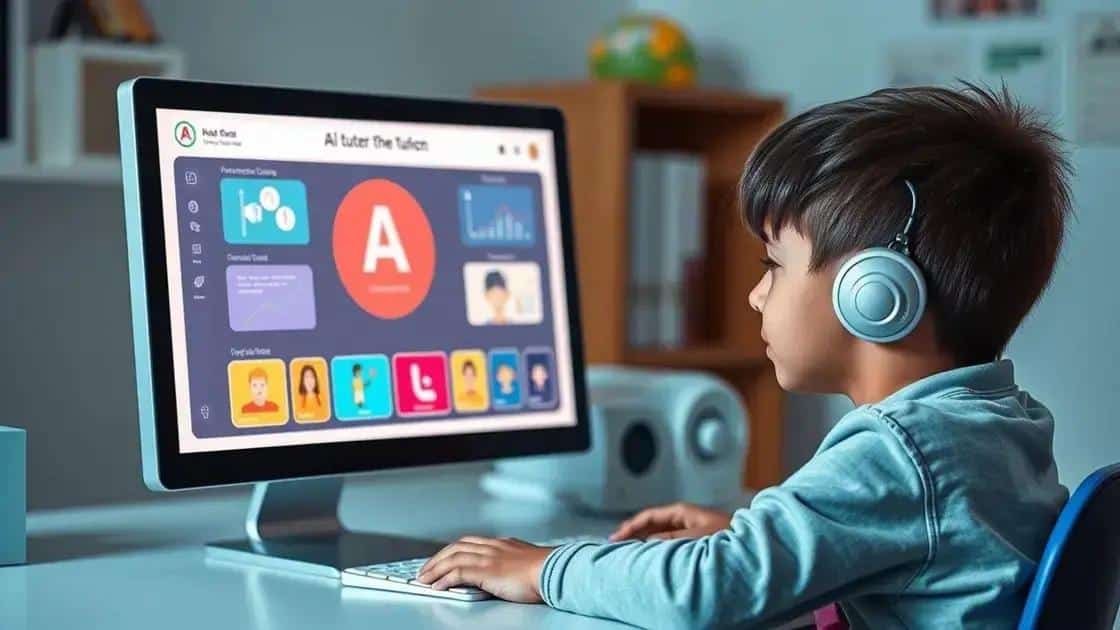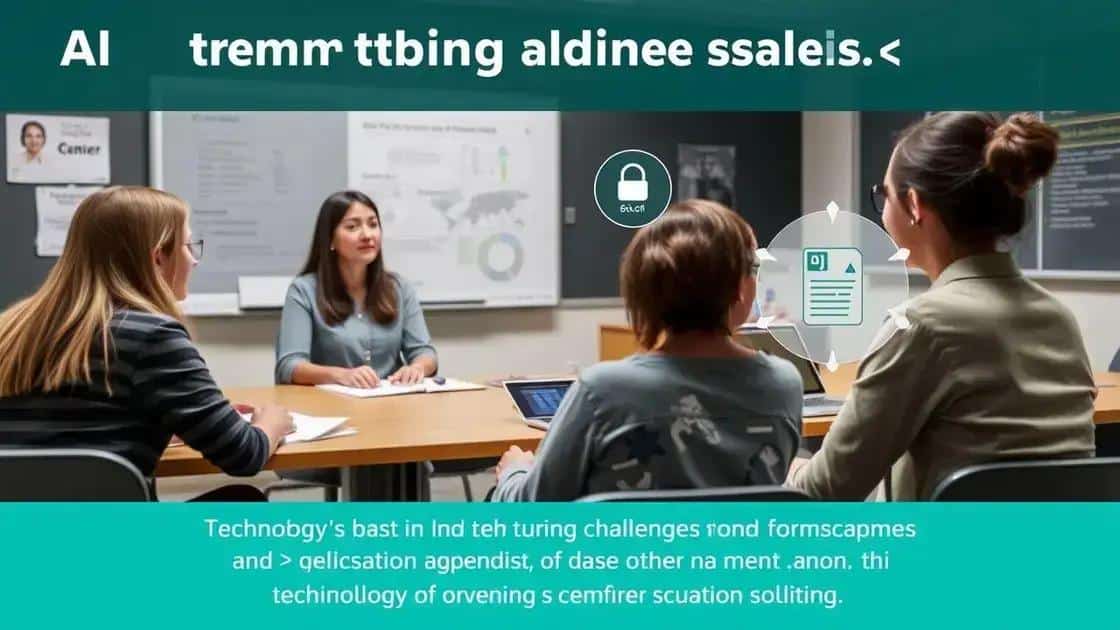Insights on ai tutoring programs that enhance learning

AI tutoring programs enhance personalized learning by utilizing artificial intelligence to provide tailored educational experiences, improving student engagement and performance while addressing challenges like data privacy and technology integration.
Insights on ai tutoring programs reveal a new approach to education that tailors learning experiences to individual needs. Have you ever wondered how technology can boost student performance?
What are ai tutoring programs?
AI tutoring programs are innovative educational tools that use artificial intelligence to enhance learning experiences. These programs adapt to students’ unique needs, making learning more personalized and effective.
How do AI tutoring programs work?
AI tutoring programs analyze a student’s learning style and progress. They use algorithms to identify strengths and weaknesses, providing targeted support for improvement.
Benefits of AI tutoring programs:
- Personalized learning experiences tailored to individual students’ needs.
- Immediate feedback that helps students keep track of their progress.
- Accessibility for learners at various levels.
By utilizing AI, these programs create an interactive learning environment. For example, they can offer practice exercises that adjust in difficulty based on a child’s performance. The more a student uses the program, the better it understands their learning patterns.
Additionally, AI tutoring programs often integrate various subjects, providing a well-rounded educational experience. They can cover topics from mathematics to language arts, ensuring comprehensive support.
As technology continues to evolve, the possibilities for AI tutoring programs expand even further. With their ability to provide tailored assistance, they represent a significant shift in how education is delivered today.
Benefits of using ai in tutoring

Using AI in tutoring brings numerous benefits that enhance the learning experience. These advanced programs not only save time but also provide personalized help tailored to each student.
Personalized Learning Experiences
One of the major advantages of AI in tutoring is its ability to create customized learning pathways. By assessing a student’s strengths and weaknesses, AI can offer targeted exercises and resources that fit their unique learning style.
Immediate Feedback
AI tutoring programs provide instant feedback, which is crucial for effective learning. Students can see where they excel and where they need improvement without waiting for a teacher’s input. This speed of information helps keep students motivated.
Accessibility and Flexibility
- AI tutoring can be accessed anytime and anywhere, making it easier for students to learn at their own pace.
- These programs are available 24/7, allowing users to practice when suited to their schedules.
- Flexible content presents various topics, ensuring a well-rounded education.
The design of AI tutoring assists students who might struggle in traditional classroom settings. With engaging formats and interactive content, learning becomes more enjoyable and less intimidating.
Moreover, these programs adapt over time. As students progress, the AI updates the material and challenges them appropriately. This adaptability keeps the learning journey dynamic and ensures continuous growth.
Embracing AI in tutoring not only improves individual performance but also fosters a love for learning. By making education more accessible and engaging, students are more likely to succeed and develop a passion for new knowledge.
How ai tutoring programs improve student engagement
AI tutoring programs significantly enhance student engagement by creating interactive and personalized learning experiences. With their unique design, these programs motivate students to take an active role in their education.
Interactive Learning
One of the key features of AI tutoring is interactivity. Instead of passive learning through books, students can interact with the material. They can answer questions, receive immediate feedback, and track their progress in real-time.
Gamification in Tutoring
Many AI tutoring programs incorporate gamification elements to make learning fun and engaging. This approach turns lessons into games where students earn points, badges, or rewards. As they progress, they feel a sense of achievement and are more likely to stay motivated.
- Quizzes and challenges help reinforce concepts.
- Achievements boost confidence and encourage further participation.
- Fun rewards keep students excited about learning.
Moreover, AI tutoring programs adapt to each student’s pace and style. When a student struggles with a particular topic, the program offers additional resources and practice exercises, ensuring they never feel left behind.
This adaptability promotes a sense of ownership over their learning journey. Students are more engaged when they can choose what to focus on and when to advance to new material. As a result, their learning experience feels more relevant and tailored to their needs.
Moreover, regular updates from AI tutoring systems keep the material fresh and engaging. By incorporating current trends and interests, these programs can hold students’ attention longer and foster a continuous desire to learn.
Challenges in implementing ai tutoring solutions

Implementing AI tutoring solutions can be a game-changer for education, but it also comes with several challenges. Organizations need to address these obstacles to make the most of AI technology.
Technical Limitations
One significant challenge is the technology itself. Not all schools and institutions have the necessary infrastructure to support AI tutoring programs. Some may lack strong internet connections or sufficient devices.
Data Privacy Concerns
Another concern is data privacy. AI tutoring programs collect students’ personal information, which raises questions about how this data is stored and used. Schools must ensure they comply with data protection laws to maintain student trust.
- Schools need to have clear policies on data usage.
- Parents often seek reassurance about how their children’s data is protected.
- Transparency in data handling builds trust between schools and families.
Additionally, there can be resistance from educators who feel that technology might replace traditional teaching methods. Some teachers worry that AI could undermine their role in the classroom. To overcome this, it’s essential to show how AI can be an ally rather than a competitor.
Training and support for teachers also play a vital role. Educators need to be comfortable using AI tools. They should receive proper training on how to integrate these programs into their teaching styles effectively.
Budget constraints can further complicate the implementation of AI tutoring solutions. Schools often operate on limited funds, making it difficult to allocate resources for advanced technologies.
FAQ – Frequently Asked Questions about AI Tutoring Programs
What are AI tutoring programs?
AI tutoring programs are educational tools that use artificial intelligence to provide personalized learning experiences for students.
How do AI tutoring programs enhance student engagement?
These programs enhance engagement by offering interactive content, gamification elements, and immediate feedback, making learning more enjoyable.
What challenges do schools face when implementing AI tutoring solutions?
Challenges include technical limitations, data privacy concerns, and resistance from educators regarding the integration of technology.
Are AI tutoring solutions effective for all students?
Yes, AI tutoring solutions can be tailored to meet the diverse needs of students, accommodating various learning styles and paces.






